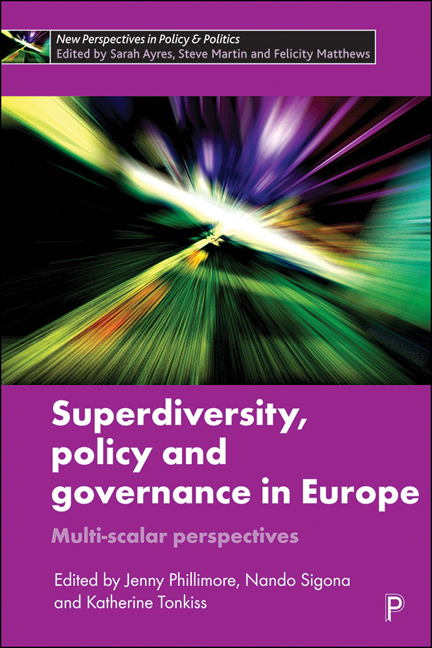Book contents
- Frontmatter
- Contents
- List of Figures and Tables
- Notes on Contributors
- Introduction: Superdiversity, Policy and Governance in Europe
- Chapter One Managing Superdiversity? Examining the Intercultural Policy Turn in Europe
- Chapter Two Mainstreaming in Response to Superdiversity? The Governance of Migration-Related Diversity in France, The UK and the Netherlands
- Chapter Three Making the Most of Superdiversity: Notes on the Potential of a New Approach
- Chapter Four Superdiversity and Sub-National Autonomous Regions: Perspectives from the South Tyrolean Case
- Chapter Five Transmigration: The Rise of Flexible Migration Strategies as Part of Superdiversity
- Chapter Six Superdiversity, Multiculturalism and Local Policies: A Study on European Cities
- Chapter Seven Integrating Superdiversity in Urban Governance: The Case of Inner-city Lisbon
- Chapter Eight Urban Planning and the Challenge of Superdiversity
- Chapter Nine Superdiversity in the Post-Industrial City: A Comparative Analysis of Backlash Narratives in Six European Neighbourhoods
- Index
Chapter One - Managing Superdiversity? Examining the Intercultural Policy Turn in Europe
Published online by Cambridge University Press: 04 March 2021
- Frontmatter
- Contents
- List of Figures and Tables
- Notes on Contributors
- Introduction: Superdiversity, Policy and Governance in Europe
- Chapter One Managing Superdiversity? Examining the Intercultural Policy Turn in Europe
- Chapter Two Mainstreaming in Response to Superdiversity? The Governance of Migration-Related Diversity in France, The UK and the Netherlands
- Chapter Three Making the Most of Superdiversity: Notes on the Potential of a New Approach
- Chapter Four Superdiversity and Sub-National Autonomous Regions: Perspectives from the South Tyrolean Case
- Chapter Five Transmigration: The Rise of Flexible Migration Strategies as Part of Superdiversity
- Chapter Six Superdiversity, Multiculturalism and Local Policies: A Study on European Cities
- Chapter Seven Integrating Superdiversity in Urban Governance: The Case of Inner-city Lisbon
- Chapter Eight Urban Planning and the Challenge of Superdiversity
- Chapter Nine Superdiversity in the Post-Industrial City: A Comparative Analysis of Backlash Narratives in Six European Neighbourhoods
- Index
Summary
Introduction
This chapter critically assesses an ‘intercultural policy turn’ evident in many European cities. It identifies the drivers of this turn and asks whether an intercultural policy approach to immigrant integration is an adequate response to the growing reality of superdiversity in urban spaces. The chapter is in conversation with the rich scholarship on immigrant integration in Europe in the political and social sciences (for example, Martiniello and Rath, 2010; Garcés-Mascareñas and Penninx, 2016).
Integration is about ‘imagining what the state can actively do to “nationalize” newcomers and re-constitute the nation-state under conditions of growing cultural diversity’ as Favell (2010, 376–7) has poignantly pointed out. This cultural diversity has become an increasing phenomenon (Faist, 2009) which policymakers in Europe have struggled to come to terms with.
The growing diversification of society is particularly evident in cities: places where international migrants mostly settle. An increasing number of cities are not only ethno-culturally diverse, but they have become superdiverse spaces and home to people who vary not only as with regards to their ethnic, national, religious and linguistic backgrounds, but also with relation to age, gender, migration status, as well as varying degrees of transnational ties (Vertovec, 2007), resulting in a complex composition of society. Population groups are not only different from each other but also exhibit significant internal diversity.
Given that cities are the ‘cradles’ of diversity, rising diversification has not only posed a challenge to national governance actors but has also drawn the attention of local policy makers. It has often been city governments, who have taken the lead, introducing and implementing immigrant integration policies and institutions, in many cases in the absence of national guidelines or policies.
Particularly since the 2000s, we have seen the adoption of an ‘intercultural’ policy approach to immigrant integration by European cities. This intercultural policy turn was reinforced by a recommendation of the Committee of Ministers of the Council of Europe to adopt an ‘intercultural approach to integration and diversity management, to foster this approach at the local and regional level, and to take it into consideration when revising and further developing national migrant integration policies’ (Council of Europe, 2015c).
- Type
- Chapter
- Information
- Superdiversity, Policy and Governance in EuropeMulti-scalar Perspectives, pp. 7 - 28Publisher: Bristol University PressPrint publication year: 2020



